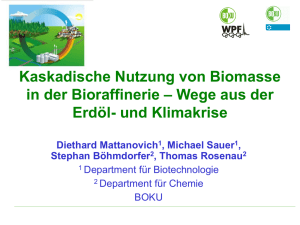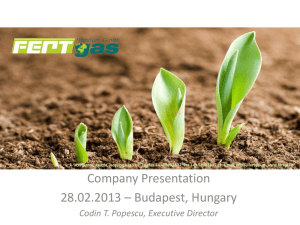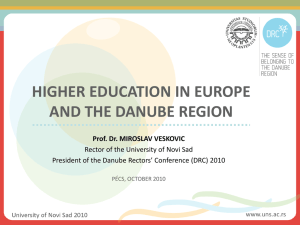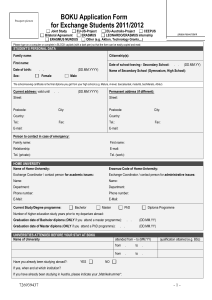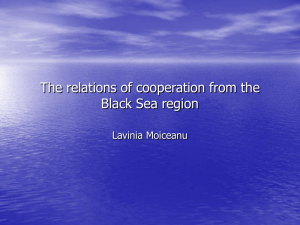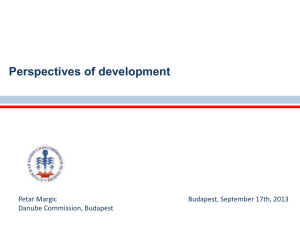Josef Glössl - New Skills for a European Bioeconomy
advertisement
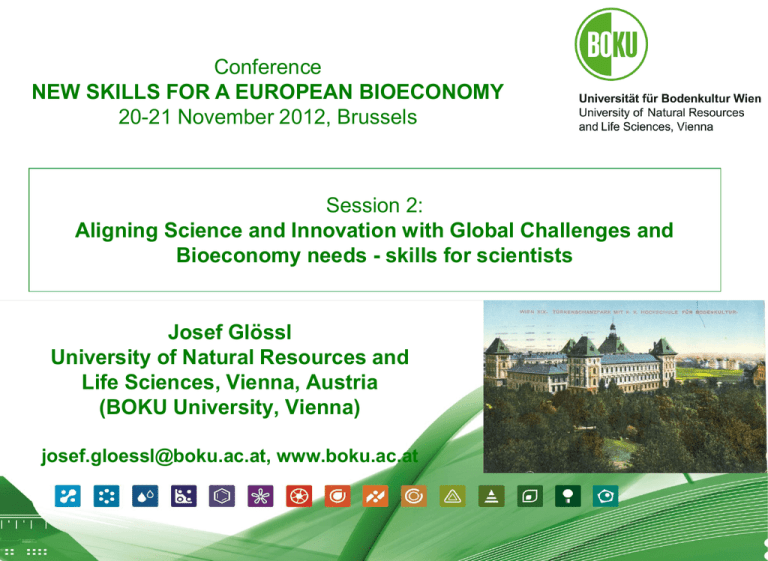
Conference NEW SKILLS FOR A EUROPEAN BIOECONOMY 20-21 November 2012, Brussels Session 2: Aligning Science and Innovation with Global Challenges and Bioeconomy needs - skills for scientists Josef Glössl University of Natural Resources and Life Sciences, Vienna, Austria (BOKU University, Vienna) josef.gloessl@boku.ac.at, www.boku.ac.at 09.07.2012 1 How to align science and innovation activities to address global challenges? Global Challenges: e.g. Sustainable management of natural resources Sustainable production Improving public health Mitigating climate change etc. Important to consider: Environmental concerns and sustainability are not just a burden for economy, but can be a source of growth and new jobs. Education, science and innovation as key drivers for a knowledgebased bio-economy Important role of universities for the development of new skills 2 Interlinking Natural Sciences, Technology & Socio-Economics: BOKU University – Themes and Competences Soil and terrestrial ecosystems Water – Atmosphere Environment Development of the Living Space Resources and societal dynamics Living space and landscape Management of Natural Resources Securing Nutrition and Health Nanosciences & - technology Renewable raw materials, resources oriented technologies Food – nutrition health Biotechnology 3 How to align science and innovation activities to address global challenges? Role of universities Education Involvement of stakeholders in curriculum development Research Excellent fundamental research as a key driver for innovation Knowledge and technology transfer Innovation Inclusion of business skills in curricula IP (Intellectual Property) strategies at universities Internationalization: Development of the university beyond its national boundaries In its region and globally Strengthening the development of international cooperative networks with both European and non-European countries (especially in the field of development assistance) Cooperation with international organisations (e.g. UN, FAO, IIASA) 4 High Potential of Bioeconomy in the Danube Region: The Danube Region: 20% of the area of the EU 115 Mill people living in the region 3 Mill. students!!! The Danube region is one of the regions in Europe with the highest potential for further economic development Biomass production could be increased by app. 30% in a sustainable way 5 What can science, research and academia do? Synergetic effects within and between the Danube Region universities have to be strengthened Establishing firm long-term co-operations based on the never completely cut links in academia in the region Development of higher eduction institutions Improve the technological basis for economic development Aiming at improving scientific infrastructure and chances for young scientists fighting the brain drain brain circulation 6 An example: ICA Regional Network for Central and South Eastern Europe (“ICA-CASEE”) Is a network of Central and South Eastern European Higher Education Institutions relating to the Life Science disciplines (agriculture, food, biotechnology, natural resources, rural development and the environment) Was founded by BOKU University, Vienna, in 2010 The objectives of network are: to support the development and implementation of the EU Strategy for the Danube Region (EUSDR) to strengthen research, education and University Development in this region to develop joint research, educational and other projects www.ica-europe.info/casee 7 ICA-CASEE Geographical Coverage 09.07.2012 8 Reasons for creating the ICA-CASEE network Enormous challenges for university development Bologna process Excellence in research, education and university management (increasing competition between higher education institutions!) Specific challenges for life science universities to develop the basis for the future development of mankind Bioeconomy Food and water security, environmental protection Sustainable use of natural resources (soil, bioresources, water,..) Development of high-end technological methods in biotechnology (biorefinery, renewable energy,....) Landscape development; urban and landscape planning And many more..... 9 Joint educational activities in the ICACASEE network: „Danube Master“ Establishing a common master curriculum on “Sustainability of Agriculture, Food production and Food Technology in the Danube Region” Consortium of 5-6 life science universities in the Danube region The curriculum will cover topics important for the further development of the region with respect to agriculture and the complete value chain. Students will stay at least at two different universities and countries to learn more about regional challenges to foster the cultural understanding. 10 Specific knowledge and skills stimulated in the „Danube Master“ Focus areas: Intercultural Learning Sustainable Rural and Regional Development Policy Food Safety, Food Technology and Food Quality and Consumer Sciences Biodiversity, Sustainable Use of Natural Resources and Sustainable Agriculture Soil and Water Biotechnology Regional Specialities Sustainable Energy Systems 11 DRC – Danube Rectors Conference Established in 1983 Members: 54 higher education institutions from 13 countries General aims: improvement of higher education in teaching and research in the region advancement of member universities by establishing and facilitating bilateral and multilateral contacts between the universities DRC Presidency changes annually Annual DRC Conference: Nov. 2011: at BOKU, Vienna Nov. 2012: at CULS, Prague Involvement in the Priority Area working groups of the EU Strategy for the Danube Region http://www.d-r-c.org 12 CDR - Centre for Development Research at BOKU University The CDR is a multi-disciplinary scientific unit located at BOKU, founded 2009 It brings together a multidisciplinary network of over twenty scientists from BOKU The CDR engages in national and international networks such as the AGRINATURA (The European Alliance on Agricultural Knowledge for Development) and the Commission for Development Studies (KEF) The CDR collaborates with a wide range of partners in Africa, Asia and Latin America It conducts applied development research and training in areas related to sustainable natural resource management. The CDR works towards poverty reduction, food security, and wellbeing for the most vulnerable population www.cdr.boku.ac.at 13 General Conclusions: The development of a European Bioeconomy requires new science policies and important new skills, fostering: Integrated approaches of research, education and co-operation Academia - Industry innovation process Complementary partnerships between universities, research centres, … joint curricula Inter- and multidsiciplinary approaches ….. Knowledge and technology transfer Development of sustainability as a big chance for economic development: Multidisciplinary integration of traditional approaches with highend (bio)technologies is a key issue in the development of a European Bioeconomy Public awareness, communication science – society 14 Universität für Bodenkultur Wien (BOKU) University of Natural Resources and Life Sciences, Vienna THANKS FOR YOUR ATTENTION! Prof. Dr. Josef Glössl Vice Rector for Research and International Research Collaboration josef.gloessl@boku.ac.at www.boku.ac.at 09.07.2012 15 09.07.2012 16
